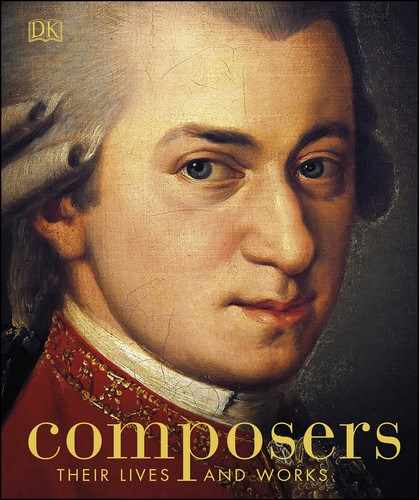Orlande de Lassus
c. 1532–1594, FLEMISH
A late-Renaissance composer, Lassus was in his day the most popular songwriter in Europe. Writing exclusively for voices, he was tirelessly prolific, composing more than 2,000 pieces of secular and sacred music.

ORLANDE DE LASSUS
An anonymous Flemish School portrait shows Lassus formally dressed and unsmiling. The composer is said to have suffered from depression in his later life.
IN PROFILE
Albrecht V of Bavaria
Duke Albrecht V (1528–1579), ruler of Bavaria from 1550 until his death, was a prominent Renaissance patron of the arts. Also a leading figure in the Counter-Reformation, he strictly imposed Catholicism in his domain, but by natural inclination he was a hedonist and an aesthete. He amassed a magnificent collection of Roman and Greek antiquities, books, jewels, sculptures, and paintings. Employing Lassus enabled him to make his Munich court the major center of music in Europe outside Italy. The duke’s lavish expenditure on collections and patronage left Bavaria heavily in debt.

ALBRECHT V OF BAVARIA WITH A LION, HANS MIELICH, 1556
Orlande de Lassus was born at Mons in the Hapsburg-ruled Netherlands (now Belgium), an area renowned for Renaissance music. Much about his origins is uncertain. His birth may have occurred in 1530 or 1532; nothing is known of his parents. His name never achieved a definite form, with variants ranging from Orlando di Lasso to Roland de Lattre.

PATROCINIUM MUSICES
This is the title page from 1589 for Lassus’s Masses for Five Voices in his Patrocinium Musices (1573–1580). The illustration at the bottom of the page shows musicians around a table.
Early days
As a child, Lassus is said to have had such a beautiful voice that he was kidnapped three times by rival choirs. Around the age of 12, he joined the entourage of a Hapsburg general, Ferrante Gonzaga, who took him to Italy. Lassus is then thought to have begun composing during his stays in Mantua, Palermo, Naples, and Milan. By 1553, he was director of music at the cathedral of St. John Lateran in Rome—an elevated post for a man in his early twenties.
In 1555, Lassus returned to the Netherlands, and his first book, a collection of his madrigals, motets, and songs, was published in Antwerp. His name came to the attention of Albrecht V of Bavaria (see box), who invited him to his court in Munich. Lassus’s first official position was as a tenor singer, but by 1563 he was the duke’s head of music, a post he would hold for the rest of his life. He married a maid of honor at the court, Regina Wäckinger; their two sons would both grow up to be composers.
A Renaissance sensation
Lassus supplied secular music for the court and sacred music for its chapel. Some of his music was reserved for the duke’s exclusive enjoyment—Lassus was not allowed to publish his much-admired Penitential Psalms until after the duke’s death. But a large part of the composer’s prodigious output appeared in print. It has been estimated that more than half of all the music published in Europe in the second half of the 16th century was by Lassus. Some of his works gained popularity well beyond the restricted circle of royal courts. He traveled widely, recruiting singers for the Munich establishment and supervising performances of his work. Lassus’s appearance at the court of the French king Charles IX in 1571 caused such a sensation that he was invited back twice. The Holy Roman Emperor elevated him to noble status and, in 1574, Pope Gregory XIII made him a knight of the Golden Spur.
The death of Albrecht V in 1579 was followed by cuts in the costly Bavarian musical establishment. Lassus’s last collection of madrigals, the haunting Lagrime di San Pietro, was completed just before his death in 1594. Some of his most famous works, including the Prophetiae Sibyllarum motets, were published posthumously by his sons.
“All were forced … to respect [Lassus] in his presence and to praise him in his absence.”
SAMUEL VAN QUICKELBERG, 1566
